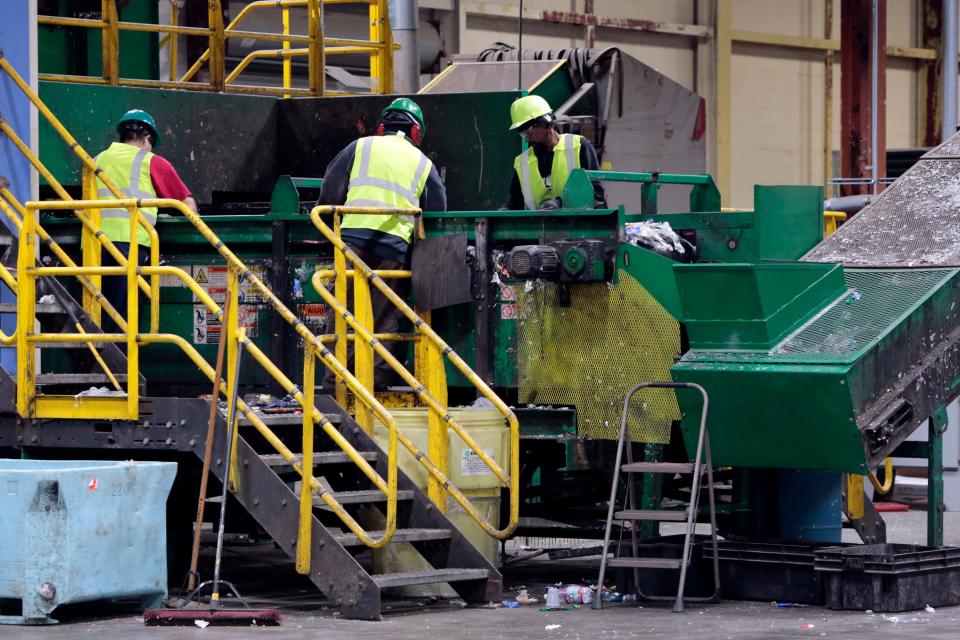'A uniquely positive outcome': New Bedford reaches no-sludge deal with Parallel Products
NEW BEDFORD — The city has reached a host community agreement with Parallel Products that bans all biosolids – also known as sewage sludge – from its processing plant expansion in the New Bedford Business Park.
The agreement between New Bedford and Parallel Products affiliates South Coast Renewables and SMRE 100 LLC states that the expansion of the recyclables processing facility at 100 Duchaine Blvd. will “not apply for or maintain any approvals that authorize the acceptance, management, transload or processing of biosolids at the facility or site in any form,” according to a press release.
It also prohibits the facility operator and subcontractors from allowing any of their trucks to use Phillips Road, a residential corridor in the North End, when traveling to or from the site.
Parallel Products will proceed with its plans to construct an enclosed municipal solid waste facility and will be required to pay the city a fee of $2 per ton of waste processed there. The company estimates that the fees will total $800,000 in the first year of operation. The city will establish a dedicated fund in which half of the proceeds from the fee will be used for public improvement projects in precincts 1-D and 1-E, where the Pine Hill Acres, Briarwood and Sassaquin neighborhoods are located, according to the release. City council approval is required to establish the fund.

Parallel Products estimates the expansion will create 75 new jobs. The increased value of the renovated property will raise its real estate taxes by at least $200,000.
The agreement also includes a “most favored pricing” clause, which establishes that, in the event that the city sends municipal waste to the facility, the city would pay the lowest price the company charges its comparable customers.
A collaborative effort: As suicide, mental health calls climb, co-response program touted as vital on SouthCoast
Summary of benefits to the city
Biosolids banned from the facility.
$30 million investment that will create 75 new jobs.
More than $200,000 in new annual tax revenue.
Additional annual fees paid to the city estimated to exceed $800,000 in the first year, half of which will be deposited in a dedicated fund for neighborhood improvements.
Trucks banned from using Phillips Road when traveling to or from the facility.
Most favored pricing clause that ensures prices for the city, should the city seek to retain Parallel Products’ services, would be no higher than the lowest prices to a comparable customer.
The company currently processes glass, plastics and cans for recycling, but is expanding its glass operations and adding the processing of municipal solid waste. The company had also wished to process biosolids as part of the expansion. The plans drew opposition from residents, city and state officials, as well as organizations South Coast Neighbors United, Community Action Works and Coalition for Social Justice.
Residents and elected officials were outspoken in their opposition to the project through protests and letters, and during city council and other public meetings. They had expressed concern about traffic, noise and negative impacts to public and environmental health.
“We made clear from the start that any expansion must protect public health and safety, mitigate environmental risks, and offset the impact to nearby neighborhoods,” Mayor Jon Mitchell said. “By eliminating biosolids from the plan and securing significant financial benefits for neighbors, this agreement achieves those goals and more.”
'Amazed by her every day': Born without the use of her hands, Cait Andre playing sports at Fairhaven... and beyond
“We’ve always said we’d never allow a sludge plant in New Bedford, and we’re very happy with what the mayor has accomplished and that this agreement prevents that,” said state Rep. Paul Schmid, D-Westport, whose district includes the New Bedford Business Park.
“A major concern of residents was the processing of biosolids, and I’m very happy that we were able to prevent this. Additionally, we’ll keep significant money from the agreement in Ward 1 to benefit our neighborhoods,” Ward 1 City Councilor Brad Markey said. “I look forward to supporting establishment of the dedicated fund for these public improvement projects.”
“This agreement looks to be a great deal for the city and the nearby residents,” City Council President Ian Abreu said. “The concerns of the neighborhood were heard loud and clear, and that’s how we arrived at this deal.”
“The agreement announced today represents a positive development for existing park companies, local residents, and the entire city,” said Liz Isherwood, chair of the Greater New Bedford Industrial Foundation, which oversees the New Bedford Business Park.
“This is a uniquely positive outcome for the city that came about through hard work, tough negotiating, and dedication to serving residents. The public benefits in this agreement will have positive impacts for neighborhoods near the Business Park and the city’s economy as a whole,” said Tony Sapienza, president of the New Bedford Economic Development Council.
Letters in opposition to the proposed expansion that included processing sludge were sent to Kathleen Theoharides, secretary of the Executive Office of Energy and Environmental Affairs, and the Massachusetts Environmental Policy Act Office in March 2021. Concerns with the project listed included:
The project does not serve the local interests of an environmental justice area and would place a disproportionate impact on environmental justice populations.
The final environmental impact report does not properly analyze impacts to public health, safety or the environment.
The report is deficient in its analysis of odor, noise, greenhouse gas emissions and traffic impacts.
The potential for waste and groundwater contamination with chemicals known as perfluoroalkyl and polyfluoroalkyl substances, or PFAS, needs to be further evaluated.
In addition to all 11 city councilors, state Reps. Antonio Cabral, Christopher Markey, William Straus, Paul Schmid III, Christopher Hendricks and state Sen. Mark Montigny signed the letter.
This article originally appeared on Standard-Times: Biosolid sewage sludge ban part of Parallel Products New Bedford plan

